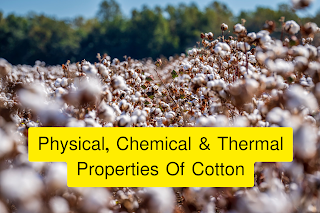Physical, Chemical & Thermal Properties Of Cotton
 |
| Physical, Chemical & Thermal Properties Of Cotton |
Composition:
In the chemical structure of cotton, the maximum portion is cellulose and the rest is composed of different types of dust and wax like materials. The whole chemical construction of cotton can be described as follows:- Cellulose:80-90 %
- Waxes & Fats: 0.5-1 %
- Proteins: 0-1.5 %
- Hemicelluloses & Pectin€™s: 4-6 %
- Water: 6-8 %
- Ash & Mineral Matters: 1-1.8 %
Physical Properties:
- Specific gravity: 1.52-1.55
- Strength (Tenacity): 3.0 - 4.9 g/d (Cotton is 20% stronger when wet). Fiber elongation is almost linear to the stress imposed
- Elasticity: Relatively low
- Absorbency and MR%: 7-8% at standard conditions
- Birefringence: 0.046
- Dielectric constant: 3.9-7.5
- Resistivity: Order of 109 ohm/cm3
- Micronaire: 2.0 - 6.5 (upland cotton)
- Denier: 0.7 - 2.3 (upland cotton)
- Length: 0.9 - 1.2 in (upland cotton)
- Diameter: 9.77 - 27.26µm
- Coefficient of friction: 0.25 (for raw dry cotton, otherwise strongly changes for treated and/or wet fiber)
- Breaking Extension: 5-7%
- Resiliency: Relatively low
- Dimensional Stability: Medium
- Abrasion Resistance: Better
ফাইবার এবং টেক্সটাইল ফাইবার এর মধ্যে পার্থক্য | Difference between Fiber and Textile fiber
Chemical Properties:
Effect of Bleach: Cotton fiber is resistant to bleach & H2O2 , NaOCl , NaClO2 , Ca(OCl)Cl are used as bleaching agents.
Effect of Acid: Cotton fiber is dissolved in high concentrated mineral acid but organic acid cannot dissolve it.
Effect of Alkali: Cotton fiber is resistant to alkali. Scouring is done by using alkali for removing impurities.
Effect of Heat: Cotton fiber burns rapidly in air. It begins to turn yellow after several hours at 120oC and decomposes at 150oC.
Effect of Sunlight: Cotton fiber can absorb heat and energy from sunlight. But excess application of sunlight may degrade the polymer system of fiber as it is attacked by the UV- ray of sunlight.
Effect of Organic Solvent: Cotton fiber is well resistant to most organic solvent.
Dye ability: Reactive, Direct, Vat, Azoic, Mordant Dyes are used to dye cotton fiber. But the best dye for cotton fiber is Reactive Dye.
Thermal Properties:
- Cotton requires particular temperature, humidity and possibly ventilation conditions.
- Favorable travel temperature range: no lower limit < 25°C
- Optimum travel temperature: 20°C
- Auto ignition temperature (for oily cotton: 120°C
- Glow temperature: 205°C
- Fire point: 210°C
- Ignition temperature: 407°C
At temperatures > 25°C, cotton dries out, becomes hard and brittle and losses elasticity. Light causes the same deterioration. The optimum temperature for mold development is 25 - 35°C.
Cotton is subject to self-heating/spontaneous combustion. The auto ignition temperature of oily cotton is 120°C.
At temperatures < 0°C there is no risk of wet bales rotting, since this process stops at low temperatures. In some cases, damaged cotton has been placed in intermediate cold storage, so preventing rot.
Every hold should be equipped with means for measuring temperature. Measurements must be performed and recorded daily.
Related Tag:
টেক্সটাইল ফাইবার কত প্রকার টেক্সটাইল ফাইবার কাকে বলে টেক্সটাইল ফাইবারের বৈশিষ্ট্য
প্রাকৃতিক ফাইবার কাকে বলে রিজেনারেটেড ফাইবার কি স্ট্যাপল ফাইবার কি অপটিক্যাল ফাইবার কত প্রকার ফাইবার বা তন্তু কাকে বলে
আরও পড়ুনঃ
➤ অরগ্যানিক তুলা কি ? জানার আছে অনেক কিছু
➤ টেক্সটাইল ফাইবার এর বৈশিষ্ট্যসমূহ
➤ ফাইবারের শ্রেণীবিন্যাস
➤ Physical, Chemical & Thermal Properties Of Cotton
➤ বিভিন্ন প্রকার ফাইবারের সাথে পরিচিতি
➤ টেক্সটাইল ফাইবার কি? স্ট্যাপল লেন্থ এর উপর ভিত্তি করে ফাইবার কতো প্রকার?
➤ টেক্সটাইল এর ফাইবার সম্পর্কিত কিছু তথ্য
➤ Morphological Structure Of Jute Fiber
টেক্সটাইল ফাইবার কত প্রকার টেক্সটাইল ফাইবার কাকে বলে টেক্সটাইল ফাইবারের বৈশিষ্ট্য
প্রাকৃতিক ফাইবার কাকে বলে রিজেনারেটেড ফাইবার কি স্ট্যাপল ফাইবার কি অপটিক্যাল ফাইবার কত প্রকার ফাইবার বা তন্তু কাকে বলে
আরও পড়ুনঃ
➤ টেক্সটাইল ফাইবার এর বৈশিষ্ট্যসমূহ
➤ ফাইবারের শ্রেণীবিন্যাস
➤ Physical, Chemical & Thermal Properties Of Cotton
➤ বিভিন্ন প্রকার ফাইবারের সাথে পরিচিতি
➤ টেক্সটাইল ফাইবার কি? স্ট্যাপল লেন্থ এর উপর ভিত্তি করে ফাইবার কতো প্রকার?
➤ টেক্সটাইল এর ফাইবার সম্পর্কিত কিছু তথ্য
➤ Morphological Structure Of Jute Fiber

wow
ReplyDeleteThanks a lot
Delete